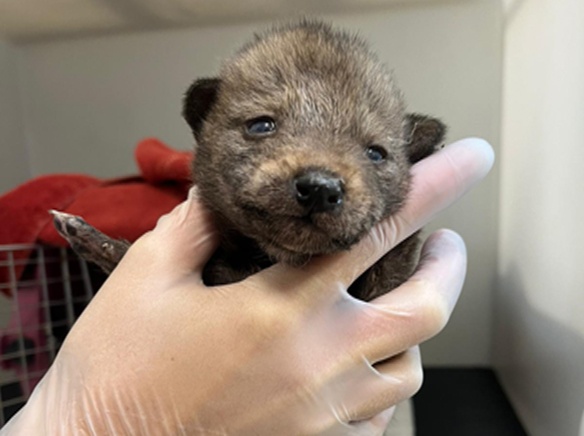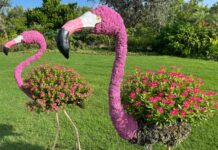Recently, four young coyote pups were brought to San Diego Humane Society’s Project Wildlife program, after being discovered under the deck of a home in Pacific Beach. Because our Project Wildlife team is unable to release the pups to their original location or to reunite them with their parents, these pups will need to be raised in captivity, until old enough to be released into the wild. While this situation is unfortunate, it serves as a valuable reminder that the best place for baby wildlife is with their parent(s)! Often, the absence of a parent doesn’t mean the baby has been abandoned. If you find a litter of wild animals, it’s crucial to leave them undisturbed while giving the parents time to return.
During the spring baby season, coyotes give birth and begin to raise litters, which are often found near their dens or burrows. Coyote pups are only in the den for 3-4 weeks, before they venture out. If the parents feel their young are threatened, they will move their pups to another den site. Often times the parents have already picked a new den site, but they wait until nighttime to safely move their pups.
Despite sharing habitats with humans, coyotes typically steer clear of human interaction. However, the presence of pet food, compost or trash can inadvertently attract coyotes to yards, creating the impression of bountiful feeding grounds. If you have unwanted wildlife in your yard, there are humane ways to encourage them to move on.
To deter coyotes from entering your yard, it’s essential to keep all food and water indoors and ensure trash is stored in high-quality containers with tight-fitting lids. If you encounter a coyote, using hazing techniques (such as yelling and waving your arms, making noise with pots and pans, or using a whistle or air horn) can effectively discourage their presence.
By using proactive measures and understanding the natural behaviors of coyotes, we can coexist with our wild friends while safeguarding both their welfare and ours. For more information about humane ways to prevent unwanted guests from entering your home and yard, visit sdhumane.org/coexist.
Nina Thompson is Director of Public Relations, San Diego Humane Society.












